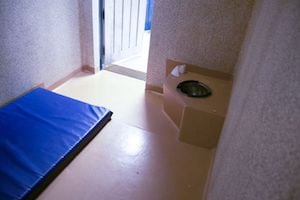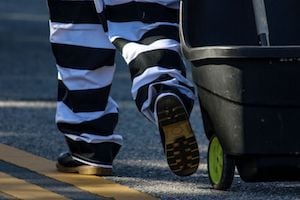North Carolina Criminal Law Chapter 90-95: Possession of a Controlled Substance on Premises of a Penal Institution or Local Confinement Facility
 Under North Carolina Criminal Law Chapter 90-95(a)(3), the crime of possession of a controlled substance on the premises of a penal institution or local confinement facility is defined as the unlawful possession of a controlled substance while incarcerated and/or on the property of a prison, jail, or any other kind of confinement facility.
Under North Carolina Criminal Law Chapter 90-95(a)(3), the crime of possession of a controlled substance on the premises of a penal institution or local confinement facility is defined as the unlawful possession of a controlled substance while incarcerated and/or on the property of a prison, jail, or any other kind of confinement facility.
It applies to inmates, Defendants in custody, and visitors to jails, prisons, and other detention centers in North Carolina such as the Department of Adult Corrections (DAC).
To prove a violation of N.C.G.S. 90-95(a)(3), the State must be able to prove the following prima facie (“first facts”) elements Beyond a Reasonable Doubt:
- Defendant knowingly possessed a controlled substance classified under the Uniform Controlled Substances Act.
- A person possesses a controlled substance when he or she is aware of its presence and has, either by himself or herself or together with others, the power and intent to control the disposition or use of that substance.
- Defendant was on the premises of a penal institution and/or local confinement facility at the time of Defendant’s possession of a controlled substance.
Defendant is arrested for Driving While Impaired in violation of N.C.G.S. 20-138.1. Defendant is taken to jail to be booked and processed.
While searching the Defendant’s pockets incident to arrest, the charing officer finds a bag of marijuana, three “bars” of Xanax (benzodiazepine), and a small amount of crack cocaine.
Defendant can be charged with felony possession of a controlled substance on the premises of a penal institution/confinement facility.
Defendant is incarcerated in the North Carolina Department of Adult Corrections. Defendant “purchased drugs” (exchanged commissary food) from other inmates for purposes of personal consumption.
Prison staff, upon receiving an anonymous tip from another inmate, conduct a shake-down of Defendant’s cell, finding contraband including a non-prescribed controlled substance.
Defendant can be charged with felony possession of a controlled substance on the premises of a penal institution/confinement facility.
Defendant goes to visit his brother who is confined in state prison. Defendant forgets that he has a vial of cocaine in his pocket. Defendant is searched in the visitor area and the cocaine is discovered.
Defendant can be indicted for felony possession of a controlled substance on the premises of a penal institution/confinement facility.
Other similar or related offenses include:
- Possession of a Controlled Substance – N.C.G.S. 90-95(a)(3)
- Aggravated Possession of a Controlled Substance – 90-95(a)(3)
- Drug Trafficking
The Defendant has a viable defense under North Carolina law if they can prove that they were authorized under the Controlled Substances to Act to possess a controlled substance on the premises of a penal institution or local confinement facility. Possession of a lawfully prescribed medication may serve as a valid defense, assuming the prisoner is authorized to possess said prescription in the manner in which it was possess and/or stored.
Defendant can also show that he or she did not have actual or constructive possession of the controlled substance at the time they were charged with the offense.
5. PenaltiesThe crime of possession of a controlled substance on the premises of a penal institution or local confinement facility is a Class H felony punishable by up to a maximum period of incarceration of 39 months in the North Carolina Department of Adult Corrections
6. Criminal Defense for Dispensing of a Controlled Substance Cases If you have been charged with felony possession of a controlled substance on the premises of jail, prison, etc., you need to contact an experienced North Carolina criminal attorney who can advise you of your rights and guide you through the court process.
If you have been charged with felony possession of a controlled substance on the premises of jail, prison, etc., you need to contact an experienced North Carolina criminal attorney who can advise you of your rights and guide you through the court process.
This is a serious offense that could carry substantial prison time, in addition to and possibly consecutive to any active period of confinement already imposed. Such an offense may also serve as a basis for a Violation of Probation.
As you might understand, a felony conviction can limit your ability to obtain employment in the future, obtain housing, and provide for your family.
Bill Powers is Board Certified Criminal Law Specialist by the NBLSC - the National Board of Legal Specialty Certification / NBTA – the National Board of Trial Advocacy.
It’s imperative to begin your defense without delay. Please call 704-342-4357 immediately.
Call NOW to schedule your complementary legal consultation with our Charlotte Criminal Defense Attorneys. Everything discussed during consultation is confidential.
Helpful Information About Criminal Charges- Probation Violations
- What is Simple Possess Sch VI CS M in North Carolina?
- North Carolina Criminal Law Chapter 90-95: Possession of a Controlled Substance With Intent to Manufacture, Sell or Deliver
- North Carolina Drug Laws: Felony Drug Charges and Misdemeanor Drug Possession Charges
- North Carolina Criminal Law 90-95(a)(2): Creating a Counterfeit Controlled Substance
- What Happens When Convicted of a Felony?
 Powers Law Firm PA Home
Powers Law Firm PA Home


















